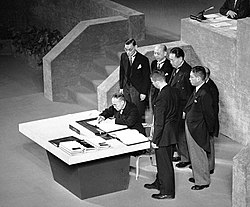The Treaty Attempts That Ended World War II, Remember This
Sabtu, 14 Januari 2023
The Treaty Attempts That Ended World War II, Remember This
Post-World War 2 Agreements and the Consequences of World War 2 – The end of World War II was marked by the surrender of the central axis countries to the allies. Then several agreements were drawn up to solve the problems of World War II. According to historical records, there were several agreements made after World War II. These agreements include:
1. The Potsdam Agreement in August 1945 which was attended by Truman (United States), Stalin (Russia), and Winston Chusrcill (English) to determine the fate of Germany.
Contents of the Potsdam Agreement, among others:
Germany was divided into two occupied territories. East Germany occupied by Russia, and West Germany occupied by the United States, and France.
The city of Berlin in East Germany was divided into 4 occupied areas. East Berlin was controlled by Russia, while West Berlin was occupied by the United States, Britain and France.
Germany had to reduce its army.
Trials for war criminals.
Germany had to pay war indemnities.
Danzig and the German territories east of the Order and Niesse rivers were ceded to Poland.

2. Agreement between the Allies and Japan, ratified in San Francisco on September 8, 1945,
as follows:
 For a while the Japanese islands were ruled by the occupying US army.
For a while the Japanese islands were ruled by the occupying US army.The Kurile and Shakalin Islands were ceded to Russia.
Manchuria and Taiwan ceded to China.
Trials of war criminals
Japan had to pay for war losses

3. The agreement in Paris in 1947 determined the fate of Italy.
with contents:
The area of Italy is narrowed
Etriest became an independent region under UN administration
Ethiopia and Albania were free from Italian rule
All Italian possessions in North Africa were taken over by the British
Italy had to pay for war losses.

4. The Allied-Austrian Treaty was implemented in Austria in 1945

with various decisions, as follows:
The city of Vienna was divided into four occupied territories and controlled by the United States, Britain, France and the Soviet Union.
Other requirements were drawn up because there was no decision and approval from the 4 victorious countries of World War II in Vienna.
5. Allied agreements with Hungary, Romania, Bulgaria, Finland concluded in Paris in 1945
with several decisions that are essentially the same, namely:
Each country is reduced in area
Each country must reimburse the war costs.

6. Peace treaty aboard the Missouri September 2, 1945:
Japan signed the above peace agreement
the United States' Missouri ship, and World War II in the Asia Pacific region ended.
Japan's surrender in August 1945 marked the end of World War II.
Broadcast of the Emperor's Order of Capitulation
At exactly 12:00 noon Japanese Standard Time on August 15, a recording of the Emperor of Japan's address to the people containing the Imperial Order on the Cessation of War was broadcast on the air.
Some of its contents:
although during those four years all have shown their best--the might of the navy and army who have fought bravely, the perseverance and tenacity of our many civil servants, and the loyal service of one hundred of our people--the war situation has not always developed in Japan's favour. , while the general situation of the world is not in our interests.
Some of its contents:

Our enemy has begun to use a new cruel bomb, killing and wounding many innocent people, its power in causing damage is, indeed, incalculable. In addition, if we continue to fight, it will not only end with the destruction of the Japanese nation but will also lead to the total extinction of human civilization.
If that's the case, how are we going to save our tens of millions of people, or make up for it in front of the holy spirits of the emperor's ancestors? This is the reason why we have accepted the terms of the Joint Declaration.
...
When you think about it, the further suffering the empire will experience, will definitely be extraordinary. We know your sincerity, people. However, wherever the demands of time and fate may take us, enduring what is unbearable, and suffering unbearable suffering, we desire eternal peace
Impact of World War II
in the political field
1. The emergence of the US and the Soviet Union as superpowers, the two countries competed in the cold war
2. New countries emerged, such as Indonesia (17 August 1945) and the Philippines (4 July 1946)
3. The emergence of political alliances formed based on common interests such as NATO and SEATO

economics
the world economy was destroyed because of the damage caused by the war. Only the US had a stable economy at that time
- spiritual field
On October 24, 1945 the United Nations was formed to maintain world peace
- social field
The United Nations formed UNRA (United national relief rehabilitation administration) to help victims of WW2.
source :
Wikipedia, and others


